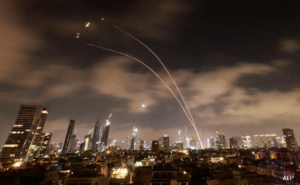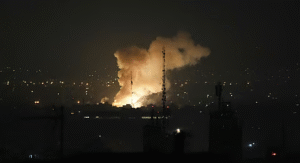The Shadow of the Houthi Missile: A Stark Reminder of Regional Interconnectedness in the Israeli-Gaza Conflict
The skies above Israel, typically a conduit for global travel and commerce, fell silent on Monday, May 5th, 2025, as a missile launched by Yemen’s Houthi rebels forced the suspension of air traffic at Ben Gurion Airport. This dramatic event, occurring mere hours before a critical vote on potentially escalating the already devastating war in Gaza, serves as a stark and unsettling reminder of the intricate and volatile interconnectedness of the Middle East. The Houthi missile, originating from a nation geographically distant from the immediate conflict zone, underscores how localized conflicts can rapidly ripple outwards, drawing in disparate actors and further destabilizing an already precarious region.

A Distant Actor’s Tangible Impact
The act itself is a significant escalation, extending the reach of the conflict beyond the immediate borders of Israel and Palestine. While the Houthis, an Ansar Allah movement controlling much of Yemen, have previously expressed solidarity with the Palestinian cause and engaged in symbolic acts, a direct missile strike capable of disrupting international air travel represents a tangible expansion of their involvement. This action can be interpreted as a deliberate attempt to exert pressure on Israel, demonstrating their capacity to project power and disrupt normalcy even within Israeli territory. Furthermore, the timing of the attack, just before a crucial vote on intensifying military operations in Gaza, suggests a calculated effort to influence the decision-making process, highlighting the potential for external actors to weigh in on the trajectory of the conflict.
Disruption and Vulnerability in Israeli Airspace
The immediate consequence of the missile strike – the halting of flights at Ben Gurion Airport – carries significant ramifications. Beyond the immediate disruption to travel plans for countless individuals, it sends a powerful message about Israel’s vulnerability. Airports are vital infrastructure, symbols of a nation’s connectivity to the world. Their closure, even temporarily, can have economic repercussions and sow a sense of unease and insecurity. This incident will undoubtedly fuel further debate within Israel regarding its security posture and the effectiveness of its defense systems against threats emanating from increasingly distant and unconventional sources.
A Complex Web of Regional Involvement
Moreover, the Houthi missile attack adds another layer of complexity to the already multifaceted Israeli-Gaza conflict. It underscores the regional dimensions of the crisis, highlighting how the struggle for Palestinian self-determination resonates with various actors across the Middle East, each with their own motivations and capabilities. The involvement of a non-state actor like the Houthis, with alleged backing from Iran, further complicates the geopolitical landscape, raising concerns about proxy warfare and the potential for the conflict to spiral into a broader regional conflagration.
International Reaction and Underlying Motivations
The international community will likely react with condemnation of the attack, particularly given its potential to endanger civilian lives and disrupt international travel. However, the incident also necessitates a deeper understanding of the underlying factors that motivate such actions. The Houthis’ involvement, while seemingly distant, is likely rooted in a complex interplay of ideological alignment with the Palestinian cause, regional power dynamics, and their own ongoing conflict in Yemen. Addressing the root causes of such actions requires a comprehensive approach that goes beyond simply condemning individual attacks and delves into the broader political and security context of the Middle East.
A Call for De-escalation and Comprehensive Solutions
In conclusion, the Houthi missile attack on Ben Gurion Airport is more than just a security incident; it is a potent symbol of the interconnectedness and inherent instability of the Middle East. Occurring on the cusp of a potential escalation in the Gaza war, it serves as a stark reminder that the conflict’s ramifications extend far beyond the immediate battle lines. The disruption of air travel underscores Israel’s vulnerability, while the Houthis’ ability to project power highlights the regional dimensions of the crisis. As the world watches the unfolding events, this incident serves as a crucial call for de-escalation and a renewed commitment to finding a sustainable and comprehensive solution to the Israeli-Palestinian conflict, one that addresses the legitimate concerns of all actors in the region and prevents further spillover of violence and instability.




















